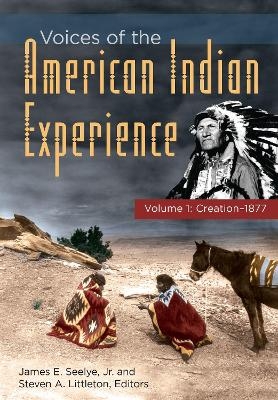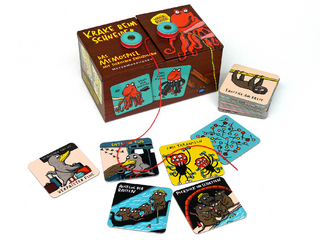
Voices of the American Indian Experience
Greenwood Press
978-0-313-38116-4 (ISBN)
- Titel ist leider vergriffen;
keine Neuauflage - Artikel merken
Voices of the American Indian Experience provides unique insights into American Indian history by focusing on Indian accounts instead of on relying on other sources. As a result, their voices are clearer, and readers learn more about Indians directly from Indians, rather than through accounts that are filtered, diluted, and possibly even misinterpreted by an outsider's perspective.
The volumes comprise a vast and fascinating variety of sources that span creation stories from Native American prehistory, to Indians who met the earliest Europeans to visit the Americas, all the way through to American Indians who served in recent foreign conflicts in the U.S. Armed Forces. This work provides information that is essential to fully understanding the history of the United States, and will be a valuable resource for advanced high school students and college students as well as general audiences with an interest in history or Native American culture.
James E. Seelye Jr., PhD, is assistant professor of history at Kent State University, OH. Steven A. Littleton is a former park ranger-interpreter at Little Bighorn Battlefield National Monument in Montana.
Preface
Introduction
Chronology of American Indian History
Part A: Creation to 1715
1. "The Creation of Beginning (Navajo/Dine)"
2. White Mountain Apache Creation Story
3. Inupiat Creation Story
4. Salish Creation Story
5. Skagit Creation Story
6. Thompson Indians Creation Story
7. Tlingit Creation Story
8. A Legend of Crater Lake
9. The Great Law of Peace (Gayanashagowa)
10. Response to the Spanish by Native Priests, 1524
11. An Account of the De Soto Expedition, ca. 1546
12. The Dutch Arrive in Manhattan, 1609
13. Powhatan, 1609: "Why Should You Destroy Us, Who Have Provided You with Food?"
14. Samuel de Champlain's Battle with the Iroquois, July 1609
15. William Wood (1634): "They Took the First Ship They Saw for a Walking Island"
16. Jean de Brébeuf, Mission to the Huron, 1635–p1637
17. John Mason Discusses the Taking of the Fort at Mystic during the Pequot War
18. The Smallpox Epidemic of 1639
19. Miantinomo, 1642–1643: "Brother, We Must Be One as the English Are, or We Shall Soon All Be Destroyed"
20. Reverend Paul Ragueneau, S. J., on Huron Martyrdom, 1658
21. Reverend François le Mercier, S. J., Describes the Anishinabe Encounter with Catholicism, 1668
22. Dialogue between Piumbukhou and His Unconverted Relatives, ca. 1671
23. The Conversion of Daniel Garakontié, an Onondaga, 1671–1672
24. Metacom's Grievances, ca. 1675
25. A Micmac Questions French "Civilization," ca. 1677
26. An Indian's Decision to Become a Christian, 1679
27. "As They Had Been in Ancient Times": Pedro Naranjo Relates the Pueblo Revolt, 1680
28. The Declaration of a Rebellious Christian Indian in the Pueblo Revolt, 1680
29. Mary Rowlandson Captivity Narrative
30. Letter from William Penn to the Committee of the Free Society of Traders, 1683
31. Edward Randolph Describes King Philip's War, 1685
32. Don Gerónimo Describes Violence and Raids against Spanish Settlements
Part B: 1716–1826
33. Pierre de Charlevoix, Journal of a Voyage, 1721
34. Chekilli—Origin of the Creek Confederacy, 1735
35. Charlevoix's Story of Kateri Tekakwitha, 1744
36. Onondaga Chief Canasatego Speaks at the Lancaster Treaty of 1744
37. The Governor of New France Warns Indians of British Designs on Their Land, 1749
38. George Croghan's Account of a Diplomatic Confrontation at Logstown, 1751
39. Atiwaneto Resists Colonial Expansion, 1752
40. Robert Eastburn's Captivity Narrative, 1757
41. Frederick Post's Mission to the Delaware and Shawnee, 1758
42. Minavavana, 1761: "Englishman!—You Know that the French King Is Our Father"
43. Pontiac Describes Neolin's Vision, 1763
44. "We Will Have Our Lands!" Dragging Canoe Speech, 1775
45. The Dominguez-Escalante Expedition (1776)
46. Corn Tassel's Speech about the Treaty of Long Island, 1777
47. Chickasaw Chief's Message to Congress, 1783
48. Joseph Brant's Message to Governor Frederick Haldimand, 1783
49. United Indian Nations: Speech at the Confederate Council, 1786
50. Saukamappee—Memories of War and Smallpox (1787–1788)
51. Cornplanter, Half Town, and Big Tree Remind President Washington of the Iroquois' Role in the American Revolution, 1790
52. The Treaty of Greenville, 1795
53. An Act to Regulate Trade and Intercourse with the Indian Tribes (1799)
54. Red Jacket—"You Have Got Our Country, But Are Not Satisfied; You Want to Force Your Religion upon Us," 1805
55. Tenkswatawa, the Shawnee Prophet: Speech to Indiana Territory Governor William Henry Harrison, 1808
56. Shawnee Chief Tecumseh's Address to William Henry Harrison (ca. 1810)
57. "Sleep Not Longer, O Choctaws and Chickasaws": Tecumseh, 1811
58. "Let the White Race Perish": Tecumseh, 1811
59. Tecumseh's Speech to the Osages in the Winter of 1811–1812
60. "We Do Not Take Up the Warpath without a Just Cause and Honest Purpose"
61. Cherokee Women's Petitions
62. The Civilization Fund Act of 1819
63. Metea—"You Are Never Satisfied": Address to U.S. Government Officials, 1821
64. Sharitarish—Address to President James Monroe (1822)
65. Mary Jemison Captivity Narrative, 1824
66. "An Address to the Whites Delivered in the First Presbyterian Church on the 26th of May, 1826"
Part C: 1827–1877
67. The Constitution of the Cherokee Nation, 1827
68. Captivity Narrative of John Tanner
69. President Andrew Jackson's Message to Congress "On Indian Removal" (1830)
70. The Indian Removal Act of 1830
71. Worcester v. Georgia (1832)
72. Black Hawk Discusses the Institution of Slavery, 1833
73. Black Hawk Talks about the Coming of the Americans, 1833
74. William Apess Narrative (1836)
75. Letter from Chief John Ross, "To the Senate and House of Representatives"
76. Memorial of Protest of the Cherokee Nation, 1836
77. Four Bears (Mato-Tope) Speech during the Smallpox Epidemic of 1837
78. Reverend John H. Pitezel, 1843–1850
79. George Copway Narrative
80. "Our Indian Difficulties" (1851)
81. Fort Laramie Treaty of 1851
82. Randolph B. Marcy Provides Tips for Westbound Pioneers, 1859
83. Big Eagle's Account of the Dakota War of 1862
84. Little Bear's Account of the Sand Creek Massacre, 1864
85. "Fort Gibson Civil War—Refugee Living Conditions"
86. Congressional Testimony of Mr. John S. Smith Regarding the Sand Creek Massacre (Washington, DC, March 14, 1865)
87. Fort Laramie Treaty of 1868
88. Bear Head—Account of the Massacre on the Marias: Massacre Occurred in 1870; This Story Not Recorded until 1935
89. Chief Red Cloud on Indian Rights
90. "Story Told by Strikes Two and Bear's Belly of an Expedition under Custer to the Black Hills in 1874"
91. Bull Eagle's Oath of Enlistment (1874)
92. Wooden Leg's Account of the Battle of the Little Big Horn, 1876
93. "We Preferred Our Own Way of Living" (1877)
Part D: 1878–1920
94. An Indian's View of Indian Affairs: Chief Joseph, 1879
95. We Ask to Be Recognized as Men (1879)
96. White Eagle's Statement Regarding the Removal of the Ponca Indians to Indian Territory
97. Standing Bear v. Crook, May 12, 1879
98. Sarah Winnemucca Narrative (1883)
99. Sitting Bull's Report to a Senate Committee, 1883
100. Merrill E. Gates on Indian Policy, 1885
101. The Dawes Act (1887): An Act to Provide for the Allotment of Lands in Severalty to Indians on the Various Reservations (General Allotment Act or Dawes Act)
102. Extract from the Annual Report of the Commissioner of Indian Affairs, October 1, 1889
103. Lone Man's Account of the Death of Sitting Bull, 1890
104. Wovoka's Message to the Cheyennes and the Arapahos (ca. 1890)
105. Ghost Dance Songs
106. Black Elk, Account of the Wounded Knee Massacre, 1890
107. An Act for the Relief of the Mission Indians in the State of California (1891)
108. Red Cloud's Speech
109. Simon Pokagon Offers the Red Man's Greeting, 1893
110. Talton v. Mayes, 1896
111. The Curtis Act of 1898
112. "Impressions of an Indian Childhood: My Mother"
113. Testimony of Clement V. Rogers, October 22, 1900
114. Zitkala-Sa, "The Cutting of My Long Hair" (1900)
115. "The Laughing Philosopher"
116. Letter from Hoopa Valley Agency Superintendent to Commissioner of Indian Affairs in Response to Commissioner's "Long Hair" Letter (July 21, 1902)
117. Why I Am a Pagan
118. Lone Wolf v. Hitchcock (1903)
119. United States v. Winans (1905)
120. Geronimo Narrative (1906)
121. The Burke Act, 1906
122. Letter Written by Susan La Flesche Picotte, M.D. to the Commissioner of Indian Affairs, 1907
123. Henry Roe Cloud—Education of the American Indian, 1914
124. A Navajo Writes Home from Boarding School, 1914–1916
125. "The Menace of the Wild West Show" (1914)
126. The Last "Wild" Tribe of California, 1915
127. Affidavit of Wallulatum Regarding the Treaties of 1855 and 1865 (April 9, 1915)
128. Arthur C. Parker Describes the "Social Elements of the Indian Problem," 1916
129. Let My People Go by Carlos Montezuma, M.D. (Apache)
130. "Phoenix Indian School"
131. Delos Lone Wolf (Kiowa): How to Solve the Problem
132. Flint Working by Ishi, 1916
133. The Story of Ishi, 1917
134. Nativity Myth at Laguna, 1918: Recorded by Elsie Clews Parsons
135. "Hunting Song" (Navajo)
136. Robert Yellowtail Calls for Self-Determination, 1919
137. Zitkala-Sa Discusses the Paris Peace Conference, 1919
138. Citizenship for World War I Veterans (November 6, 1919)
139. "How Aua Became a Shaman"
Part E: 1921–1973
140. "What Has Happened to the Crow Indian Horses"
141. A Klamath Story
142. Indian Citizenship Act of 1924
143. Luther Standing Bear Recalls His First Buffalo Hunt, 1928
144. The Problem of Indian Administration: Report of a Survey Made at the Request of Honorable Hubert Work, Secretary of the Interior, and Submitted to Him, February 21, 1928 (Meriam Report)
145. "A Tamed Old Man"
146. "The White Man's Depression of 1930"
147. Stealing Horses from the Arapahoe, Chief Plenty Coups (Crow), 1930
148. "Across the Big Water" (1932)
149. Luther Standing Bear on "What the Indian Means to America" (1933)
150. Luther Standing Bear on Education, 1933
151. The Indian Reorganization Act of 1934
152. Petition to Eleanor Roosevelt, 1934
153. John Collier, an "Indian Renaissance," 1935
154. Flying Hawk's Recollections of Wounded Knee (1936)
155. Navajo Livestock Reduction
156. Eva Spicer Whitetree Nichols Interview, April 21, 1937
157. Esther Naktewa's Letter to Santa Claus, 1937
158. "Life of a Cherokee Woman"
159. Kate Shaw Ahrens Interview, 1937
160. Interview with Rudolph White Shield, Cheyenne Indian (February 26, 1938)
161. Memorandum Regarding the Enlistment of Navajo Indians (March 6, 1942)
162. The Iroquois Declaration of War on Germany, 1942
163. Indian Claims Commission Act of 1946
164. "Counting Coup and Capturing Horses"
165. Letter from Ray Fadden of Akwesasne Mohawk Counselor Organization to President Harry S. Truman Regarding Burial of an Indian at Arlington National Cemetery (September 3, 1951)
166. House Concurrent Resolution 108 (August 1953)
167. Indian Relocation Act of 1956
168. A Pima Indian, George Webb, Discusses "Progress" (1959)
169. "A Statement Made for the Young People"
170. "We Are Not Free" (1967): Clyde Warrior (Ponca)
171. Indian Civil Rights Act of 1968
172. Sohappy v. Smith (1969)
173. "This Country Was a Lot Better Off When the Indians Were Running It"
174. Suppressed Speech of Wamsutta James, 1970
175. "We Hold the Rock!" The Alcatraz Proclamation to the Great White Father and His People, 1970
176. All-Indian University and Cultural Complex on Indian Land (1970)
177. NARP's Eight-Point Program
178. "We Have Endured. We Are Indians: To the President and the People of the United States" (1970)
179. "To Be Indian in Los Angeles"
180. Alaska Native Claims Settlement Act, December 18, 1971
181. Letter to the President of the United States, December 18, 1971, from Joseph Upicksoun, President, Arctic Slope Native Association
182. Trail of Broken Treaties (1972)
183. "Wounded Knee More Important than Watergate"
184. Menominee Restoration Act of 1973
185. "Three-Point Program of the American Indian Movement"
186. About AIM.
Part F: 1974–Present
187. United States v. Washington—Boldt Decision (1974)
188. "I Believe in the Laws of Nature"
189. Indian Self-Determination and Education Assistance Act, 1975
190. Pacific Northwest Stories
191. Convicted of Being Chippewa and Sioux Blood by Leonard Peltier (1977)
192. American Indian Religious Freedom Act
193. Indian Child Welfare Act of 1978
194. "The Haudenosaunee Declaration of the Iroquois: Haudenosaunee Statement to the World" (May 1979)
195. "On the Art of Stealing Human Rights" (1979)
196. "Uranium Mining in the Black Hills"
197. For America to Live, Europe Must Die, 1980
198. United States v. Sioux Nation of Indians (1980)
199. All Indians of the Nation on Trial (1983)
200. The Tekakwitha Conference Responds to Recommendations that Father Junipero Serra Be Declared Venerable, 1987
201. Hodel v. Irving (1987)
202. House Concurrent Resolution 331 (1988)
203. Waterlily
204. National Tekakwitha Conference Vision Statement, 1988
205. Tribal Colleges
206. Native American Grave Protection and Repatriation Act
207. Greg Sarris Interview (March 9, 1992)
208. White House Conference on Indian Education, 1992
209. Haudenosaunee Faithkeeper, Chief Oren Lyons Addressing Delegates to the United Nations Organization Opened "The Year of the Indigenous Peoples" (1993) in the United Nations General Assembly Auditorium, United Nations Plaza, New York City, December 10, 1992
210. The Tekakwitha Conference Native Profession of Faith, 1995
211. Indian Sacred Sites Executive Order 13007, May 24, 1996
212. "No Matter What Happened to the Indians, We Will Always Have Our Spirit" by Bonnie Ballard (Fort Hall Shoshone-Bannock): American Falls, Idaho—Age 1671
213. Oren Lyons Narrative, 1997
214. "Use Science, but Trust Our Own Knowledge"
215. How to Skin a Polar Bear by Linda Akeya (Siberian Yup'ik)
216. When People Carrying Bibles Came by Blanche Jones Criss
217. New Paths, Old Ways by Verné Seum, Iñupiaq
218. Minnesota v. Mille Lacs Band of Chippewa Indians, March 24, 1999
219. Vernon Bellecourt Speech at Kent State, May 4, 2000
220. Stumped? Magazine Interview with Chris Eyre (September 2002)
221. Declaration on the Rights of Indigenous Peoples (2006)
222. Lieutenant Bill Cody Ayon (Southern Cheyenne), New Mexico National Guard, Interviewed on September 16, 2007, Camp Cropper, Iraq
223. Interview with John EchoHawk
224. 'Twas the Night before Ojibwe Christmas
Further Reading
Index
About the Editors
| Erscheint lt. Verlag | 30.11.2012 |
|---|---|
| Sprache | englisch |
| Gewicht | 2070 g |
| Themenwelt | Geisteswissenschaften ► Geschichte ► Regional- / Ländergeschichte |
| Geschichte ► Teilgebiete der Geschichte ► Kulturgeschichte | |
| Sozialwissenschaften ► Ethnologie | |
| Sozialwissenschaften ► Soziologie | |
| ISBN-10 | 0-313-38116-X / 031338116X |
| ISBN-13 | 978-0-313-38116-4 / 9780313381164 |
| Zustand | Neuware |
| Haben Sie eine Frage zum Produkt? |
aus dem Bereich


